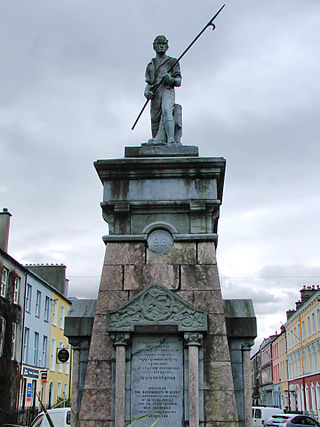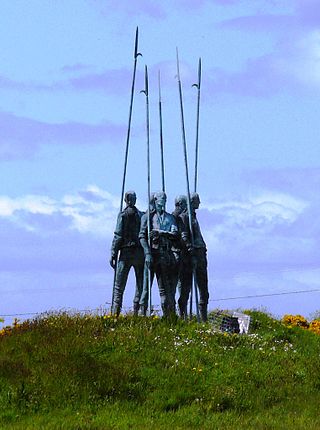In the music of Ireland, Irish rebel songs are folk songs which are primarily about the various rebellions against English Crown rule. Songs about prior rebellions are a popular topic of choice among musicians which supported Irish nationalism and republicanism.

The Irish Rebellion of 1798 was a popular insurrection against the British Crown in what was then the separate, but subordinate, Kingdom of Ireland. The main organising force was the Society of United Irishmen. First formed in Belfast by Presbyterians opposed to the landed Anglican establishment, the Society, despairing of reform, sought to secure a republic through a revolutionary union with the country's Catholic majority. The grievances of a rack-rented tenantry drove recruitment.

The "Battle Cry of Freedom", also known as "Rally 'Round the Flag", is a song written in 1862 by American composer George Frederick Root (1820–1895) during the American Civil War. A patriotic song advocating the causes of Unionism and abolitionism, it became so popular that composer H. L. Schreiner and lyricist W. H. Barnes adapted it for the Confederacy.

"The Bonnie Blue Flag", also known as "We Are a Band of Brothers", is an 1861 marching song associated with the Confederate States of America. The words were written by the entertainer Harry McCarthy, with the melody taken from the song "The Irish Jaunting Car". The song's title refers to the unofficial first flag of the Confederacy, the Bonnie Blue Flag. The left flag on the sheet-music is the Bonnie Blue Flag.

The Battle of Vinegar Hill was a military engagement during the Irish Rebellion of 1798 on 21 June 1798 between a force of approximately 13,000 government troops under the command of Gerard Lake and 16,000 United Irishmen rebels led by Anthony Perry. The battle, a major rebel defeat, took place on 21 June 1798 on a large rebel camp on Vinegar Hill and in the streets of Enniscorthy, County Wexford and marked the last major attempt by the rebels to hold and control territory taken in Wexford.

Croppy was a nickname given to United Irishmen rebels during the Irish Rebellion of 1798 against British rule in Ireland.
The Defenders were a Catholic agrarian secret society in 18th-century Ireland, founded in County Armagh. Initially, they were formed as local defensive organisations opposed to the Protestant Peep o' Day Boys; however, by 1790 they had become a secret oath-bound fraternal society made up of lodges. By 1796, the Defenders had allied with the United Irishmen, and participated in the 1798 rebellion. By the 19th century, the organisation had developed into the Ribbonmen.
"The Wearing of the Green" is an Irish street ballad lamenting the repression of supporters of the Irish Rebellion of 1798. It is to an old Irish air, and many versions of the lyric exist, the best-known being by Dion Boucicault. The song proclaims that "they are hanging men and women for the wearing of the green".

Bartholomew Teeling was an Irish military officer and nationalist who was the leader of the rebel forces during the Irish Rebellion of 1798 and who carried out an act of bravery during the Battle of Collooney. He was captured at the Battle of Ballinamuck and subsequently executed for treason.

The Wexford Rebellion refers to the events of the Irish Rebellion of 1798 in County Wexford. From 27 May until 21 June 1798, Society of United Irishmen rebels revolted against British rule in the county, engaging in multiple confrontations with Crown forces. The most successful and destructive rising in all the counties of Ireland, United Irishmen rebels experienced a number of early successes in the county despite being seen as a relatively loyal county by the Dublin Castle administration due to a series of military victories. However, the tide soon turned against the United Irishmen in Wexford as Crown forces poured into the region, engaging in a brutal counterinsurgency which indiscriminately targeted suspected rebels and eventually suppressed all rebel activities in the county.
Events from the year 1764 in Ireland.

The battle of Ballynahinch was a military engagement of the Irish Rebellion of 1798 between a force of roughly 4,000 United Irishmen rebels led by Henry Munro and approximately 2,000 government troops under the command of George Nugent. After rebel forces had occupied Newtownards on 9 June, they gathered the next day in the surrounding countryside and elected Munro as their leader, who occupied Ballyhinch on 11 June. Nugent led a column of government troops in 12 June which recaptured the town and bombarded rebel positions. On the next day, the rebels attacked Ballyhinch, but were driven back and defeated.

The Battle of Saintfield was a short but bloody clash in County Down, Northern Ireland. The battle was the first major conflict of the Irish Rebellion of 1798 in Down. The battle took place on Saturday, 9 June 1798.
Robert Jocelyn, 2nd Earl of Roden KP, PC (Ire) was an Irish peer, soldier and politician. He was styled The Honourable from his birth to 1771, and then Viscount Jocelyn from 1771 to 1797. He was the eldest son of the 1st Earl of Roden and Lady Anne Hamilton, daughter of James Hamilton, 1st Earl of Clanbrassil.

"The Bold Canadian" was a patriotic song for Canadians that originated during the War of 1812. It celebrated the conquering of Detroit in Michigan Territory.

"The Red Flag" is a socialist song, emphasising the sacrifices and solidarity of the international labour movement. It is the anthem of the British Labour Party, the Northern Irish Social Democratic and Labour Party and the Irish Labour Party. It was formerly used by the New Zealand Labour Party until the late 1940s. The song is traditionally sung at the close of each party's national conference.

George Watson-Taylor, of Saul's River, Jamaica, was a plantation owner and Member of Parliament (MP) at Westminster. In 1810 he married into the family of the planter Sir John Taylor, 1st Baronet, in time adding the Taylor surname to his own, and becoming the richest planter on Jamaica. He bought a house in Cavendish Square, London, and Erlestoke Park, near Devizes, Wiltshire. As MP for a number of constituencies, where he was brought in without contests, he supported the Tory administration, and campaigned for the retention of slavery.

The Battle of the Big Cross was a military engagement of the Irish Rebellion of 1798 between a force of United Irishmen rebels and a column of government troops. It was fought on 19 June 1798 on a spot on the Shannonvale-Ballinascarty road known locally as the "Big Cross", approximately four miles east of Clonakilty in West Cork. It was the only battle fought in the rebellion in County Cork.

The Irish Republic of 1798, more commonly known as the Republic of Connacht, was a short-lived state proclaimed during the Irish Rebellion of 1798 that resulted from the French Revolutionary Wars. A sister republic of the French Republic, it theoretically covered the whole island of Ireland, but its functional control was limited to only very small parts of the Province of Connacht. Opposing British forces were deployed across most of the country including the main towns such as Dublin, Belfast and Cork.